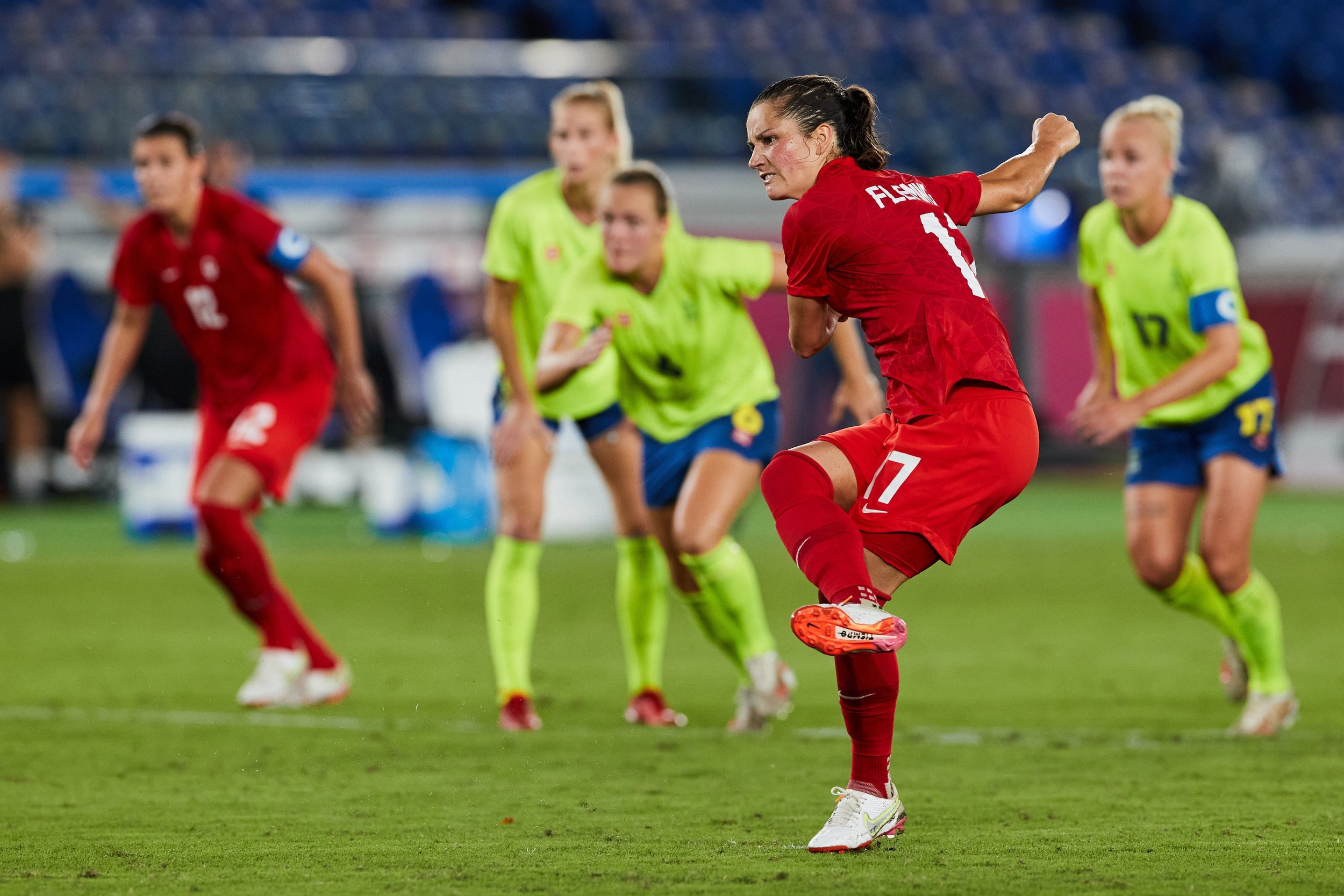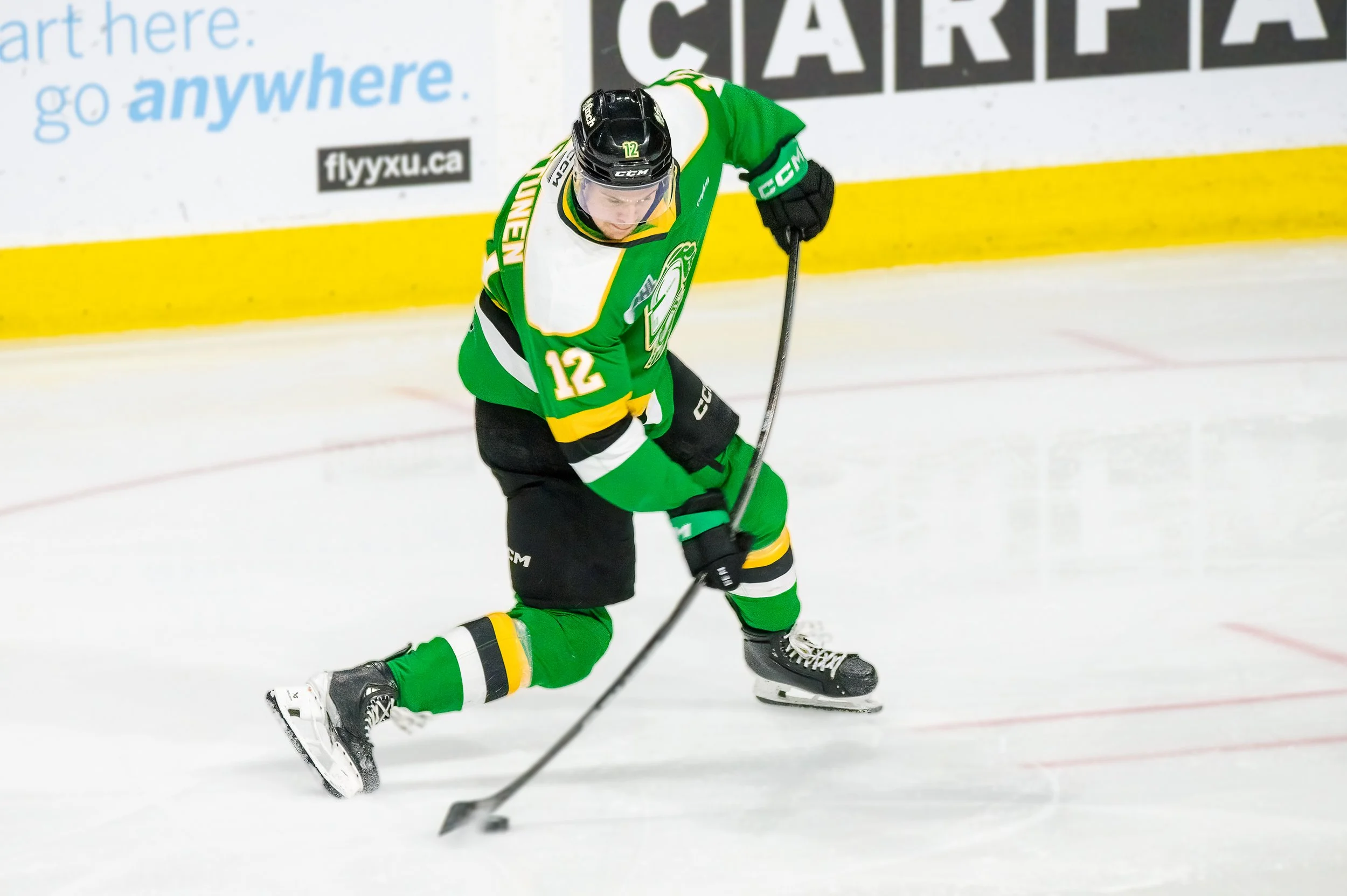Fleming discovering her new role — rising star
At 23, Jessie Fleming is meeting the challenge of playing on the world’s biggest pitches with her heroes — while evolving into one herself.
Fleming delivers a penalty against Sweden in last summer’s Olympic gold medal final (Photo: Canada Soccer by Mexsport).
* * *
Not that long ago, Jessie Fleming only knew them as heroes.
Growing up in the Forest City, she was that little girl, the one imitating them on the pitch, the one studying their every move. Christine Sinclair. Erin McLeod. Diana Matheson. Desiree Scott.
Heroes. All.
Until one day, there they were, sitting across the training table from the then 18-year-old phenom preparing for the Rio 2016 Summer Olympics. Heroes were now teammates, colleagues, friends.
“I was extremely nervous. If you ask a lot of my teammates now, they’ll say that I was mute for the first year or two I was on this team,” Fleming says. “But I was quite young and maybe not super comfortable in my own skin yet. I was in that stage of life where you’re still trying to figure out what your identity is and you’re hanging out with all these people who are way more established and settled in themselves. It was very daunting.”
Today, those nerves are long gone for the now 23-year-old Fleming who stands as one of Canada’s rising stars.
* * *
“Over the last five to 10 years, things have evolved in my life. It seems like I’ve made some big decisions every couple of years and just rolled with where those have taken me.”
Those decisions have landed Fleming on the biggest pitches in the world.
Her Tokyo 2021 performance is already the stuff of Canadian sports lore. She scored the lone goal on a penalty kick in a semi-final win over the United States. Then, in the final, she scored on a penalty kick in regulation and again in a shootout against Sweden to help give Canada its first-ever soccer gold.
Last weekend, Fleming helped Chelsea FC win the Women’s FA Cup final, 3-0, against Arsenal at Wembley Stadium as the club clinched a ‘domestic treble’ for the first time in franchise history. Making international headlines, it was an incredible win for the club.
Chelsea’s domestic treble includes its FA Cup, WSL, and Community Shield victories. A 4-0 loss to Barcelona in the Champions League final in May denied the storied franchise a ‘legendary quadruple.’
It was yet another entry in the stellar resume for Fleming, a developing international star still growing accustomed to the spotlight.
“Chelsea was one of those decisions. I wanted to put myself in a challenging player environment with some of the best players in the world, and so when that opportunity came up, I was excited to grab it,” says Fleming, who also won last season’s FA Women’s Super League title and the League Cup during her rookie professional campaign.
“There have been so many of these key moments, key opportunities that I’ve been lucky enough to be given. I have gone into these more challenging situations, situations where I was maybe a bit out of my league, be it on the pitch or academically, and I tried my best to lean into the challenge. It’s made me better for it. I’ve learned a lot about myself.”
* * *
“One of the things that we talk about in this environment is how pressure is something we can choose to create or we can choose not to create. For me, I just go back to the plan I have for myself and my aspirations. At the end of the day, I’m going to work as hard as I can to achieve those. But if I don’t, I can be satisfied that I’ve put the hard work in and I’ve challenged myself.”
Fleming knows there is pressure that comes with budding fame. But with the help of veteran teammates, and Canada Soccer’s sport psychology team, she has learned to manage the inner dialogue that enters everyone’s heads – even the heads of elite athletes. “Learning more about the mental side of performance has helped me grow and tackle the improvement process in a productive way,” she says.
With Team Canada, Fleming has grown years of trust, understanding, and familiarity on and off the pitch with her teammates. It took time to find that footing, but she credits those who she once called heroes with creating that environment.
“It has been great to discover that my role models, the people who I was aspiring to become, are these fantastic, good human beings who work hard and have the most noble and honest intentions,” Fleming says. “That’s what I wanted to be. I feel very lucky to have been put in the same room as these guys for years. I wanted to be just like them.”
Now, a new generation is looking to her to be that role model. Fleming is growing into the role, but she knows it will take time – and maybe always feel a touch odd.
“It still catches me by surprise to see some of those younger girls wearing my jersey,” she laughs. “When I’m sitting in my own brain, I’m thinking about all the things that I still want to improve on. I don’t see myself in the position that maybe they do – I don’t know if I’ll ever see myself in that position.”
But she has come to recognize in herself what she saw in her heroes when she was the girl sitting in front of the television or in the stands.
(Photo: Canada Soccer by Mexsport)
“Those moments are nice because it allows you to appreciate things, maybe bring a little smile or a little bit of motivation to someone who wants to emulate something I’ve done – much in the same way I looked to all these players on the national team,” Fleming continues. “It’s also cool for little girls to see other girls and women in these positions, playing on clubs in Europe, playing for their country. Hopefully, they are seeing a little bit of themselves in us. That can be really powerful.”
Oddly enough, this weekend’s FA Cup final took place exactly 100 years to the day since England’s Football Association banned women from playing football on league-affiliated grounds because it deemed it “most unsuitable” for them to play the game. The ban lasted nearly 50 years.
“I think about how powerful it is when little kids, especially little girls, see women in these positions – as athletes, as female coaches, or as women in any environment or in any position where they’re a role model – and for these girls to be able to see themselves in these women and say, ‘I want to emulate this’ or ‘I want to be like this person.’ It helps kids dream when they have that person they’re aspiring to be.”
* * *
It’s hard to imagine, but the next decade might be even more exciting than the last for Fleming.
At 23, her game is still unfolding, still evolving. She takes pride in knowing she is pushing the standard in Canada for what it means to be a Canadian midfielder and Canadian attacking player.
“We’ve always been known for defensive prowess and how hard we are to score on and how tough we are, but I think with some of our younger players there’s just more of an emphasis on the technical side of the game, and how we can keep improving how we are on the ball,” Fleming says. “I want to be a part of the players driving that evolution and just keep improving my attacking side of the game and help Canada become more dangerous.”
It seems like an incredible amount of pressure on a young person – but she maintains an impressive perspective.
“I don't feel pressure, really. I try not to put too much energy into what other people are expecting me to do or how other people are perceiving me. When you asked about what I’ve learned about myself on this team and over the last couple of years, it’s definitely been on focusing on what I want for myself and being OK with the result so long as I put the work in.”
Part of that comes from the support of her family back home in London.
“They have always been there to remind me that I had people who loved me if I didn’t play well or if a game didn’t go well. They were the first ones to call me after a big win. They celebrated more and harder than I did in our backyard in London, Ont., this summer (after the Olympics). My parents and siblings, and even my extended family, have been my biggest supporters for a long time.
“With my parents, it’s an unspoken understanding that even if this whole soccer thing doesn't work out, or if I missed one of those PKs or wasn’t successful at a pro team, I always know that they just want me to be happy and they’ll support me in whatever I do. When you talk about pressure, they don’t put any pressure on me. They just want me to enjoy what I’m doing, and they’ll be happy to support and cheer me on.”











Around the Diamond: London looking to clean up defense; Majors welcome new face, Tucker Zdunich; Skylar stepping up in bullpen; Niles plays the hero early in Majors’ career. Our news & notes …